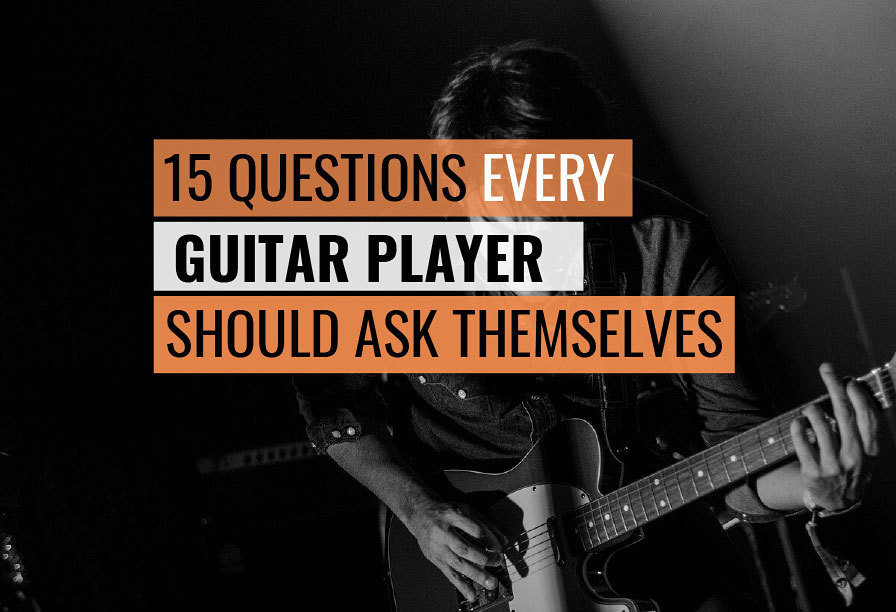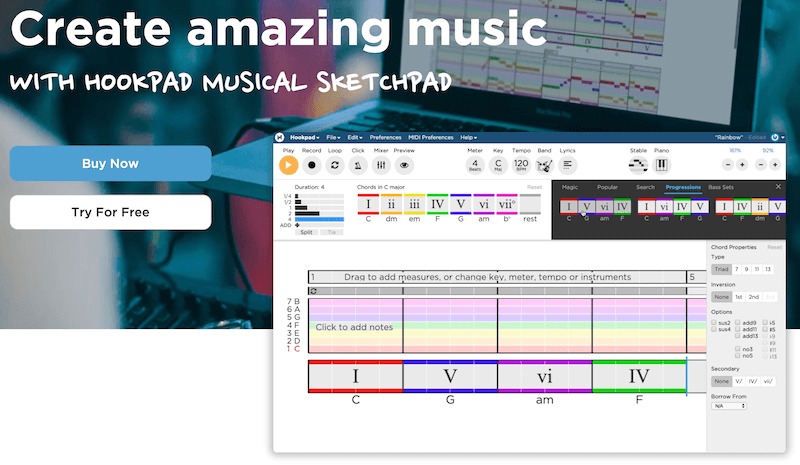15 questions that will change the way you think about guitar playing: Learn how to turn your weaknesses into strengths, stay motivated, and achieve your musical goals faster than ever before.
Are you a guitar player who’s feeling stuck? Maybe you’re not progressing as quickly as you’d like or struggling to stay motivated.
Perhaps you’re feeling unsure about whether you’re on the right track or if what you’re doing is worth your while.
If so, you’re not alone.
Even the best musicians hit walls from time to time.
The good news is there are things you can do to overcome these challenges and quickly improve your guitar skills. One of the most effective ways is to ask yourself the right questions.
In this blog post, I will share with you 15 questions that every guitar player should ask themselves regularly to take your playing to the next level.
Let’s go for it.
15 Questions That'll Improve Your Guitar Playing Fast

#1. What inspired you and made you want to learn guitar in the first place?
This is a great question to start with because it reminds you of your original passion and motivation for playing guitar.
Think back to when you first picked up the instrument and what drew you to it. Was it a song, a band, a person, or a feeling?
How did it make you feel when you played your first chord, riff, or solo? Try to reconnect with that excitement and enthusiasm that sparked your interest in guitar playing.
#2. What are some of your long-term playing goals?
Having clear and specific goals is essential for guitar players who want to improve their skills and achieve their dreams.
Without goals, you will lack direction and motivation in your practice. Think about what you want to accomplish with your guitar playing in the long term.
Do you want to play in a band, record an album, write songs, perform live, teach others, or simply have fun? Make your goals SMART (Specific, Measurable, Achievable, Relevant, and Time-bound).
#3. Imagine being able to achieve all your guitar-playing goals. What would that be like?
This question is similar to the previous one but allows you to dream big and imagine the possibilities without any limitations or doubts.
Think about what would make you the happiest and most fulfilled as a guitar player. What would be your ultimate achievement or reward?
Don’t be afraid to be ambitious! This question will help you discover your true passion and purpose for playing guitar.
#4. How does playing guitar make you feel?
Playing guitar is not only a skill but also an emotion. It can affect your mood, energy, confidence, and well-being.
Playing guitar can make you feel happy, sad, angry, calm, excited, or anything in between. Think about how playing guitar makes you feel and why.
What emotions do you experience when you play? How do they affect your performance and enjoyment? How do they influence your musical choices and preferences?
#5. If someone is thinking about learning guitar, what is the one tip or piece of advice that has helped you the most?
This question will help you reflect on your learning process, identify valuable lessons and insights that have improved your guitar skills, and avoid a playing rut.
Think about what tips or advice have made the biggest difference in your playing or have saved you from making common mistakes or pitfalls.
What would you tell someone who is just starting out or who is struggling with their guitar playing? Share your wisdom and experience with others.
#6. What’s one of the trickiest chord shapes you’ve learned so far, and why?
Chords are the foundation of any guitar player’s repertoire. They allow you to play songs, accompany singers, create harmony, and express yourself musically.
Learning new chords can be challenging but also rewarding. Think about one of the most difficult chord shapes you have learned and why it was hard for you.
How did you overcome the challenge? How did it improve your finger strength, flexibility, accuracy, or coordination? How did it expand your musical vocabulary and options?
“The beautiful thing about learning is that nobody can take it away from you.” B.B. King
#7. If you could be any famous musician, who would it be and why?
This question is a fun way to explore your musical influences and inspirations. Think about the musicians who have shaped your guitar-playing style, taste, or personality.
Who are some guitar players you admire or emulate? Who are some of the artists that you would love to learn from or jam with?
Put yourself in their shoes and imagine playing like them. They started just like you did, with potential to be developed.
#8. Do you often feel like the week went by too quickly and you didn’t practice enough?
This question will help you evaluate your guitar practice habits and routines. Think about how much time you spend playing guitar each week and how satisfied you are with it.
Do you practice regularly, consistently, and effectively? Do you have a schedule or a goal for each practice session?
Do you track your progress and results? Or do you practice sporadically, randomly, and aimlessly? Do you procrastinate, get distracted, or lose interest?
Be honest with yourself and see if there is any room for improvement.
#9. If you answered yes to question #8, what are the reasons you can’t practice enough?
This question will help you identify and overcome the obstacles that prevent you from practicing your guitar as much as you would like.
Consider what factors may interfere with your practice quality or time. Is it due to a lack of time, motivation or discipline?
Are you struggling to find motivation to practice? Identify and eliminate any internal or external barriers, such as doubt, boredom, and distractions. This will help you create a better practice environment.
#10. When it comes to learning new techniques or skills, do you settle for “good enough” or are you willing to put in the time to achieve perfection?
This question will help you assess your attitude and mindset towards learning new things on guitar.
Think about how you approach new challenges and difficulties on your instrument. Do you have a growth mindset or a fixed mindset?
Do you embrace mistakes and failures as opportunities to learn and improve? Or do you avoid them and give up easily?
Do you strive for excellence and mastery? Or do you settle for mediocrity and complacency?
#11. What three skills make a great guitar player?
This question will help you define your criteria and standards for being a great guitar player.
Think about what are some of the essential skills that every guitar player should have or develop.
Guitar skills can be divided into four main categories:
- Technical skills: speed, accuracy, timing and rhythm
- Musical skills: theory, harmony, melody, and timing
- Creative skills: improvisation, composition, and arrangement
- Personal skills: confidence, communication, and expression
#12. How do you work on the four skills outlined in the previous question when you practice?
This question will help you design your practice strategy and plan based on your desired skills and outcomes.
Think about how you can incorporate each of the four skill areas that make a great guitar player into your practice routine. What exercises, songs, or methods do you use to work on each skill?
How do you measure your progress and performance on each skill and balance your practice time between each one?
#13. Have you ever played your guitar for friends and family? If you answered no, why not?
This question will help you explore your comfort level and confidence in playing guitar in front of others.
Think about how often and with whom do you share your guitar playing. Do you enjoy playing for others, or do you avoid it?
Do you feel nervous or excited when you play for others? How do they react to your playing and how does their feedback affect your playing?
#14. Have you ever performed at a live gig or open mic night, or is it one of your long-term goals? If not, why?
This question will help you challenge yourself and expand your comfort zone as a guitar player. Think about how often and where you perform live with your guitar.
Do you seek out opportunities to play in front of an audience or do you shy away from them? Do you have any fears or anxieties about performing live?
If yes, how do they affect your playing? How do you prepare for a live performance and cope with any stage jitters?
#15. What will you do today to get closer to your guitar-playing goals?
This question will help you take action and make progress towards your long-term playing goals.
What is one small but meaningful step that you can take today to move closer to achieving your guitar dreams?
There are many small things you can do to improve your musical skills. For example, you could:
- practice for an extra 10 minutes
- try learning a new challenging song or technique
- watch a tutorial or lesson to learn something new
- join an online community for support on your learning journey
Summing it Up
You’ve made it to the end of this post, and I hope you’ve learned a lot from these 15 questions.
They are designed to help you quickly improve your guitar skills by challenging yourself, expanding your knowledge, and having fun.
Remember, the best way to learn anything is by doing it. So don’t just read this post, but apply what you’ve learned to your own practice sessions.
You’ll be amazed at how much progress you can make in a short time. Keep playing, keep learning, and keep rocking! 🎸











